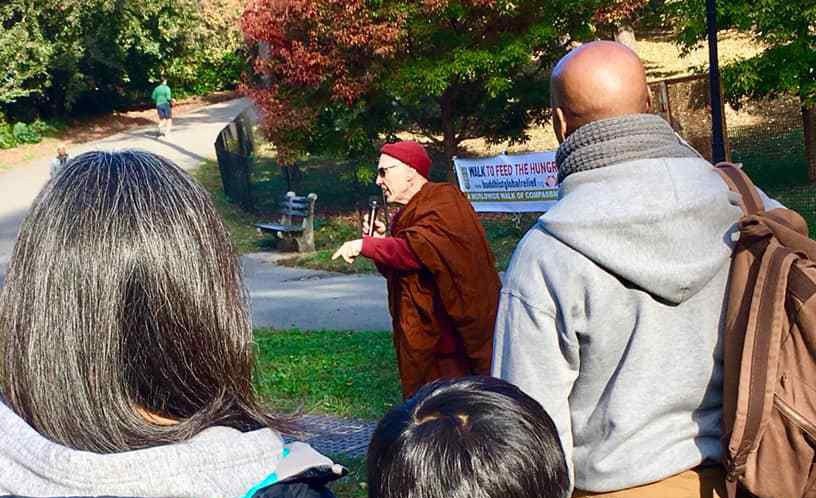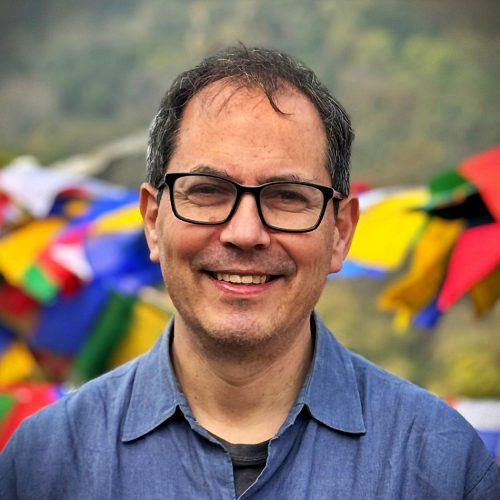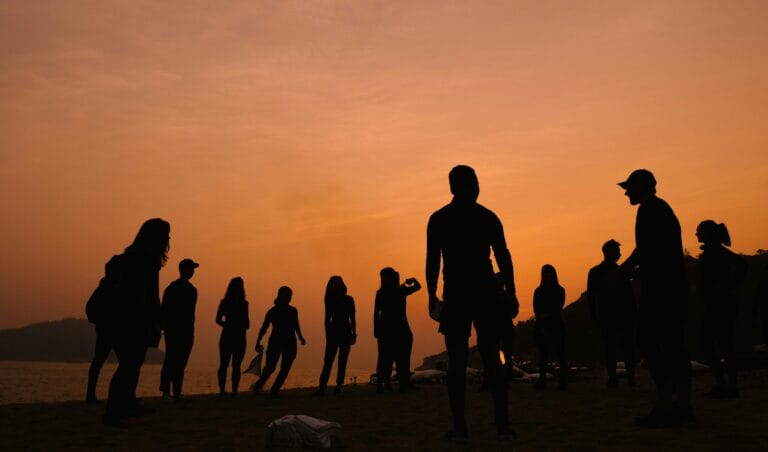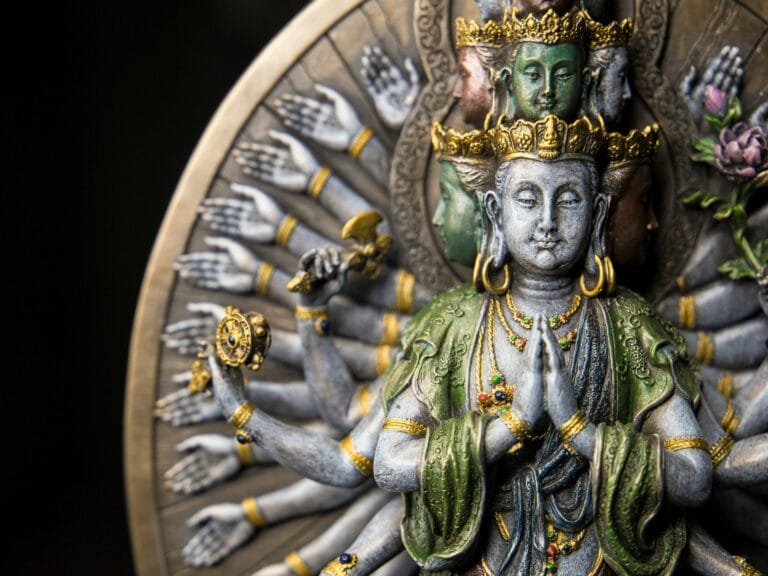Insight Journal (IJ): Ven. Bodhi, you are best known as a scholar and translator of Buddhist texts, but in recent years you have also emerged as a Buddhist activist. How did this transformation in the direction of your life come about?
Bhikkhu Bodhi (BB): I would not consider myself an “activist,” but more accurately, a theorist who opens up doors of theory for more fully engaged Buddhist activists to find a basis for their commitment to action. Let me briefly explain how I found myself in that role. Before I became involved with Buddhism, I had considered myself a social and political progressive. During the mid-1960s, I joined the protest movement against the U.S. war in Vietnam and was sympathetic to the civil rights movement. Like many young people of the time, I shared the hope that we were finally about to enter an era of love, peace, and justice when all the wrongs of the world would be set right—the era summed up in Bob Dylan’s song “The Times They Are A-changin’.“
It was during this period that I began to read about Buddhism. When I was studying for a PhD in philosophy at Claremont Graduate University, I befriended a Vietnamese monk at the university who became my first Buddhist teacher. As I became more involved with Buddhism, I grew convinced that projects aimed at social and political renewal provided only a superficial solution to our problems. I believed I could do more to benefit the world by working on myself. By the time I left the U.S. for Sri Lanka late in the summer of 1972, my interest in political and social issues had almost vanished. Instead, I wanted to plunge into the study and practice of the Dhamma, which I understood as a personal journey toward liberation. I knew that the most favorable condition for practicing the path was that of a Buddhist monk, and I was convinced that the best way I could help others was by serving as a model and by sharing the Buddha’s teachings.
My relative indifference to social and political issues continued through the first twelve years of my life as a monk. In 1984, I went to live with the German elder, Ven. Nyanaponika Mahathera (1901–94), at the Forest Hermitage in the Udawattakele Reserve near the upcountry town of Kandy. Ven. Nyanaponika had come to Sri Lanka in 1936 and had been ordained under the first monk from Continental Europe, Ven. Nyanatiloka Mahathera (1878–1957). In 1958, together with two lay supporters, he founded the Buddhist Publication Society (BPS), where he served as president and long-time editor. In 1984 when I came to look after him, he decided to pass his positions on to me. I became editor for the BPS in 1984 and president in 1988. I now found myself saddled with new responsibilities that I had not anticipated during my early years of training. In 1985, the BPS started a quarterly newsletter, and I was obliged to write an editorial essay for each issue. I felt that it was not sufficient for me to use this column merely to expound basic Buddhist doctrine and practice. I believed, rather, that I should also discuss how the Buddha’s teachings offered original insights into the challenges facing us in the modern world.
It seemed Buddhism itself was being taken up as a comforting path to personal fulfillment rather than as a means of tackling the deepest roots of suffering both for oneself and for others.
This project forced me to widen my perspectives beyond a narrow focus on the classical formulations of the Buddha’s teachings. At the same time, while living with Ven. Nyanaponika, I noted that he himself had a keen interest in current events. I could observe that he ingested news about current events not from worldly interest in politics but from a deep and wide empathy with humankind and a concern for the world’s future. My close association with Ven. Nyanaponika over a ten-year period, up to his death in 1994, gradually transformed my own attitudes to world events. My progressive social concerns were starting to re-awaken, but I still needed a change of scene before they could fully emerge.
That opportunity came in 2002 when, after twenty straight years in Asia, I returned to the United States. Here I had full access to the internet and could check out websites providing in-depth coverage of global events and articles exploring these issues from a progressive perspective. At the same time, as I saw how Buddhism was being assimilated in this country, I was struck by the contrast between the vast waves of suffering crashing over the world’s population, which I read about on the internet, and the complacent, almost self-absorbed attitudes discernible among many American Buddhists. Many middle-class American Buddhists seemed barely aware of the misery that overwhelmed ninety percent of the world’s population—misery due to poverty, social and political oppression, militarism, and economic globalization. It seemed Buddhism itself was being taken up as a comforting path to personal fulfillment rather than as a means of tackling the deepest roots of suffering both for oneself and for others. It occurred to me, with some dismay, that while Buddhism extols such qualities as loving-kindness and compassion, too many contemporary Buddhists have tended to pursue these virtues primarily as subjective internal states rather than as spurs to transformative action.
As I spoke and wrote about my concerns, several of my students and Buddhist friends responded, and we opened discussions about how together we might express a more dynamic Buddhist conscience in the contemporary world. The fruit of our discussions was the founding in 2008 of Buddhist Global Relief (BGR). We started off by giving ourselves a broad mandate, to “address the plight of people worldwide afflicted by poverty, natural disaster, and societal neglect,” but it did not take us long to realize that we had to give our mission a more specific direction. We decided to take chronic hunger and malnutrition as our focus. We started our work toward the end of 2008 with three small projects. Now, fifteen years later, BGR sponsors sixty projects in countries ranging from Mongolia and Vietnam to Kenya, Cameroon, Nicaragua, Haiti, and the U.S. Chronic hunger is interwoven with a number of other issues, and so BGR projects not only provide direct food aid but also promote girls’ education, women’s livelihood, and ecologically sustainable models of agriculture. These projects have lifted thousands of people up from degrading poverty and given them a new lease on life. We also provide occasional emergency relief, though BGR is not a disaster-relief organization.
In 2017, after Donald Trump was inaugurated as president, several of us in the New York area felt the need to create a Buddhist organization that could counter some of the repressive policies of the new administration. We convened a gathering at Union Theological Seminary in February 2018 that attracted over 200 Buddhists from around New York, which culminated in the creation of the NYC Buddhist Action Coalition. Unfortunately, as time went on, more and more people dropped away from the coalition. The covid lockdown prevented in-person gatherings, and we also struggled to establish a cohesive organizational structure and a sharp, clear mission for the group. Since I live upstate, I also began to fall away. But members in the city continue to meet and recently they have been holding open outdoor meditations at Union Square for peace in the Middle East.
IJ: You have devoted your life to the study and practice of classical Buddhist teachings. One of the anthologies of your translations is The Buddha’s Teachings on Social and Communal Harmony. Can you share with us some of what you think is most important about the Buddha’s teachings on social and communal harmony today?
BB: The content of the book is very rich, and so I find it hard to single out specific passages that might be relevant to social and communal harmony today. However, a comprehensive overview of the book shows that the Buddha, while detached from the world, was not an aloof figure abiding in solitary peace but was actively engaged with the society around him. In this respect, I believe, he differed significantly from his contemporaries. It might even be said that the Buddha envisaged a new type of society—even a new civilization—that stood in sharp contrast to the Brahmanic society of his time. Because the Brahmanic model was becoming dominant, it would have been hard for the Buddha to actively propose a total overhaul of the North Indian social system. But the principles he laid down—which rejected the divine origins of the caste system and gave precedence to human well-being at multiple levels—had the potential to serve as the blueprint for a new society, and his ideas took on this role once the Dhamma was transmitted to regions free from Brahmanic dominance.
I arranged the content of the book in a way intended to show the underlying program for social transformation that we can discern scattered in different places in the canonical collections of the Buddha’s teachings. What is critical about this program is its stress on moral and mental cultivation as a basis for social and communal harmony. Thus, I included individual chapters on such topics as right view, mind training, right speech, dealing with anger, and good friendship, which are all critical to the success of a community.
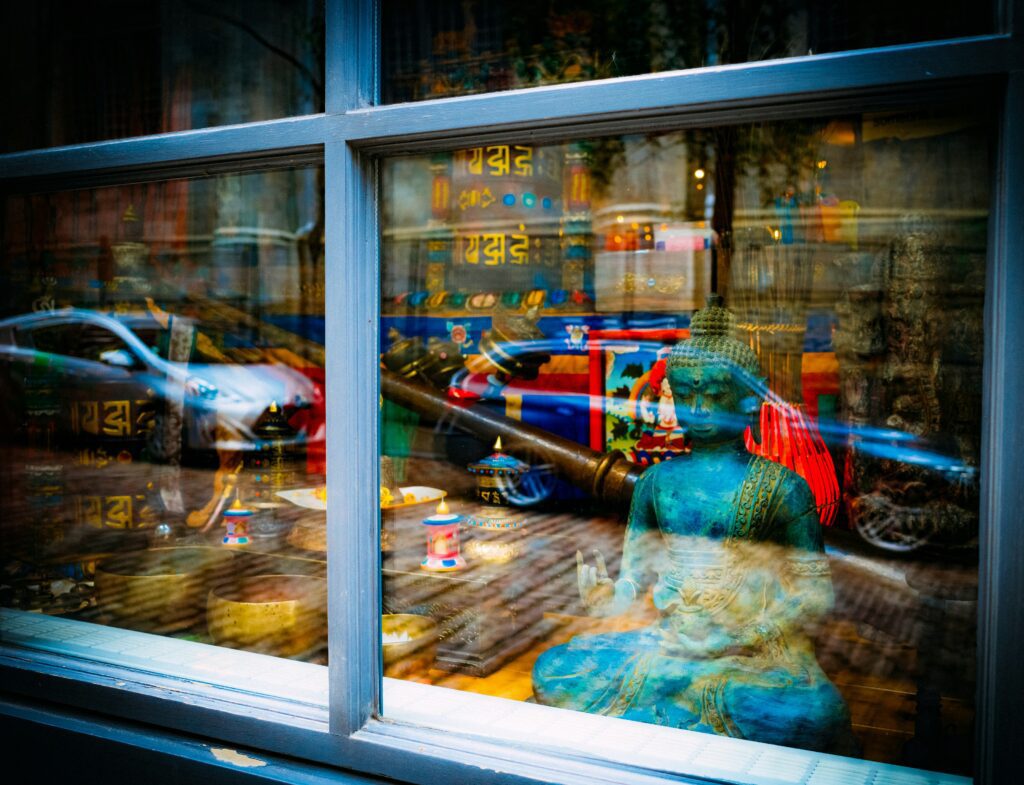
As the book makes clear, in his role as a spiritual teacher the Buddha had to take on two momentous tasks with social dimensions. One was to establish a monastic order made up of people who brought their human flaws into monastic life and thus needed structures, guidelines, and regulations to further their spiritual development within the framework of a viable, effective monastic institution, one that could sustain the Dhamma long into the future. The other task he faced was to provide guidelines for the wider society beyond the boundaries of the monastic community. Here the Buddha must have drawn upon his background as a kshatriya, a member of the administrative class. At the time, two competing political models prevailed in northern India. One was that of the old tribal republics, which were on the decline; the other was the monarchies, which were expanding and swallowing up the older republics. The Buddha sought to rein in the destructive drives of ambitious kings by setting up the ideal of the “wheel-turning monarch,” who rules in subordination to a higher moral authority, that of the Dhamma. What strikes me of greatest interest in this section (chapter 10) is the Buddha’s stipulation that one of the duties of the righteous ruler is to ensure that there is no poverty in his realm. In today’s world, and in the U.S. as well, where we see vast disparities in wealth and power, this teaching seems exceptionally prescient.
IJ: Bhikkhu Bodhi, even as you have lived a life that is so deeply informed by the monastic code and your thinking is grounded in early Buddhist texts, you have been very active in embodying the Buddha’s teachings in the contemporary world, for example, speaking out about climate change. How do you see your engagement with the contemporary world as part of your Buddhist practice?
BB: I don’t believe that the Dhamma should be seen as a static teaching completely and perfectly embodied for all time in the teachings of what is now called “Early Buddhism.” I believe, rather, that the Dhamma is a living spiritual organism that has to evolve in response to the conditions of the culture and society in which it is embedded, unfolding and bringing to manifestation its inherent potentialities. These may be merely latent in earlier eras and come to expression with the passage of time, as changing social and cultural conditions—and the fresh insights of percipient Buddhist thinkers—bring them out into the open.
This is particularly the case with the ethical teachings of Buddhism. We might stipulate that Buddhism has passed through at least three stages of development, each with a corresponding ethic: a traditional stage, a modern stage, and a post-modern stage. Each of these stages has its own subdivisions, but to keep matters simple we can posit these three primary stages. All the historical forms of Buddhism that we inherit today—Theravada, Mahayana, and Vajrayana—developed in the traditional stage, and their ethics, while differentiated by tradition, reflect the predominant outlook of a premodern culture. The modern stage, as I see it, emerges with the response of Buddhist traditions to contact with the West—with the Western colonial project, the Christian missions, and modern science, among other challenges. Many of the strands making up this stage have been explored by David McMahan in his book, The Making of Buddhist Modernism, so I need not elaborate on them here. In Asia, we can see manifestations of the ethical dimensions of Buddhist modernism in attempts to emulate Christian-inspired projects of humanitarian service and social upliftment. These have largely been spearheaded by lay Buddhists, but with background support from prominent monastics. In the world of East Asian Buddhism, expressions of Buddhist modernism can be seen in Taixu’s “Buddhism for Human Life,” in Yinshun’s “Human Realm Buddhism,” and in the more pragmatic adaptations of their ideas by the Dharma Drum, Tzuchi Foundation, and Buddha’s Light organizations in Taiwan.
We now live in a culture poised between the modern and the post-modern. In a post-modern culture, religions face the task of engaging more actively with the world, but in ways that are more particular and specific, yet also inter-penetrative, than in the earlier modern phase. In a post-modern culture, attention is directed to the ways that different spheres of life, different “life worlds,” intersect and penetrate each other and increase in their relevance to ordinary people engaged in a quest for meaning at a time when universal, all-encompassing narratives are no longer cogent. From an ethical perspective, in such a culture, a religious teaching serves not only as a map guiding us to a state of “deliverance,” however conceived, but as a force of conscience with the task of steering our communal actions—including social and political programs—toward a vision of the good that best reflects its ethical ideals. Thus, as I see it, as Buddhists lives at the edge of a post-modern culture we must place special emphasis on addressing the wider domains in which our lives unfold, including the political sphere.
I think what would mark the distinction between a modernist and postmodernist approach to this “mundane” application of the Dharma is the multiplicity and diversity of the ways the teachings are being adapted to address the many concerns that impinge on our consciousness. For instance, we witness the emergence of a Buddhist racial ethic, an environmental ethic, an ethic that revolves around sexual and gender identity, an ethic embodied in the quest for a more just economy, etc. We might be able to trace the seeds of these ideas in classical Buddhist texts, but such ideas have never previously been as fully articulated and explicated as they are today. Postmodern trends might also be seen in the readiness of Buddhists from different traditions to recognize the value of other traditions (including non-Buddhist forms of spirituality) and to learn from them, even to engage in their practices. This leads to various forms of cross-pollination and hybridization. A postmodern orientation appears in the multiplication of many small localized sanghas not dependent on large umbrella organizations, and in the emergence of new expressions of the Dhamma, some a bit unconventional.
As I now look at our current global situation, I think we can distinguish three major domains of human life. One is the transcendent domain, the sphere of enlightenment and liberation, the realization of nirvanic peace and freedom, which is the aspiration for classical Buddhism. The second is the social domain, which includes interpersonal ethics as well as our political, social, and economic policies and modes of organization. And the third is the natural domain, which includes our physical bodies, other sentient beings, and the natural environment. From my present viewpoint, a spirituality that privileges the transcendent and devalues the social and natural domains, or sees them at best as stepping-stones to higher realization, is inadequate to our current needs. As I see it, our collective future calls for an integral type of spirituality that can integrate the three domains of human life.
I believe that the Dhamma is a living spiritual organism that has to evolve in response to the conditions of the culture and society in which it is embedded, unfolding and bringing to manifestation its inherent potentialities.
This means that, under the impetus of love and compassion, we must bring the wisdom gained from our insights into the transcendent back into the world to transform and refashion the social and natural domains in ways governed by transcendent realization, or at least by the principles implied by such realization. In the social domain we must strive for models of governance embodying justice, equity, compassion, and shared prosperity. In the natural domain we must learn to respect the intrinsic value of nature, treat other living beings with care and reverence, and ensure that the natural world preserves its self-regenerating capacities so that future generations can inherit a supportive and thriving planet.
I feel that today it’s incumbent on us as Buddhists not to turn away from the sufferings of the world and blithely dismiss them as “the intrinsic nature of samsara.” Rather, we have to spread our gaze, widely and clearly, over the global landscape and discern the vast and often excruciating suffering that afflicts the human population—and other life forms—especially in those parts of the world that don’t ordinarily impinge upon our consciousness. Looking at national and global issues from the standpoint of a Buddhist conscience, we must make the effort to see the deep and hidden webs of causation that lie behind this suffering. Then we must try to find ways to alleviate that suffering, effectively and decisively, in a spirit and with means that best accord with the Dhamma. This applies particularly when suffering emerges from oppressive and exploitative social, economic, and political systems—systems that create systemic or structural suffering. While we ourselves may live in relative comfort and security, these systems crush the lives of billions of people around the world whose faces we will never see and whose names we’ll never know. But we can do our share to alleviate that suffering.
As my anthology shows, the Buddha himself tried to unpack the secular implications of the Dhamma against the backdrop of his own time, doing so within the constraints of his own culture. Whereas renunciants of that time were expected to be fully detached from mundane concerns, the Buddha showed a keen awareness of how ethics should guide those spheres of action. Since today we live in a democratic country—or at least in a country with democratic institutions—we share the responsibility of co-creating the reality of the world in which we live, for ourselves as well as for countless others. And this means that, from the highest ethical perspective, we have the obligation to strive to create a world that will work for everyone, not just for the affluent.
This is precisely where I am critical of much of the rhetoric of contemporary Buddhism. It seems to me that modern Buddhism has committed itself to what we might call “the happiness project,” that is, to the idea that it’s sufficient for us to teach people how to practice mindfulness of the present moment as a means of finding happiness and peace in their everyday lives. This may be all well and good, but, I ask, is that sufficient? Is that going to work for people who are facing perilous job insecurity, unemployment, lack of health care, astronomical medical costs, humongous university debt, formidable housing costs, exploding climate disasters, rampant gun violence, the danger of authoritarian rule, the rise of a repressive machismo culture, etc.? Can we just teach people: “Practice mindfulness and enjoy your life, and you’ll be happy and at peace”? Maybe it’ll work for some, but in my view, we need to develop a sharp and clear critique, rooted in the Dhamma, that challenges the dominant social, political, and economic models that put our common future at risk. From the stance of Buddhist social insight, we need to delineate constructive alternatives that will enable us all to flourish within the boundaries of a vibrant planetary eco-system.
IJ: You identify as an ethnically Jewish Buddhist monk. In some ways, the Jewish prophetic tradition shares important moral values with Buddhist traditions. I am thinking, for example, of Isaiah I:17, where he says, “Learn to do right; seek justice. Defend the oppressed. Take up the cause of the orphan; plead the case of the widow.” Do you see any resonance between the prophetic Jewish commitment to address the suffering of the vulnerable and the Buddhist emphasis on compassion and reducing suffering?
BB: Although I am ethnically Jewish, I come from a secular Jewish background. To comply with family obligations, I went to Hebrew school and had a bar mitzvah, but I have to admit, with some embarrassment, that I have not read the Hebrew prophets and thus my thinking is not directly influenced by them. However, since my college days, I have always been temperamentally inclined to a progressive political orientation. I see the progressive orientation—with its strong emphasis on social, racial, and economic justice, its concern to preserve a viable environment, its opposition to militarism, and its responsiveness to the needs of the poor and the most vulnerable—to be the stance that resonates most closely with the ethical values of Buddhism. The qualities endorsed by Buddhist ethics, such as loving-kindness, the wish to promote the well-being and security of others, and compassion, the wish to rescue beings from suffering, seem to me to correspond best with a progressive political outlook and to receive their practical implementation in progressive policies. The kind of policies I favor aim at establishing a just and generous social democracy guided by a universal ethic that protects people from harm and promotes the common good. Sadly, however, with the rise of extreme right-wing political forces, the movement toward such a social democracy is being blocked and undermined, and a drift toward autocracy, even an American brand of fascism, looms dangerously on our horizon.
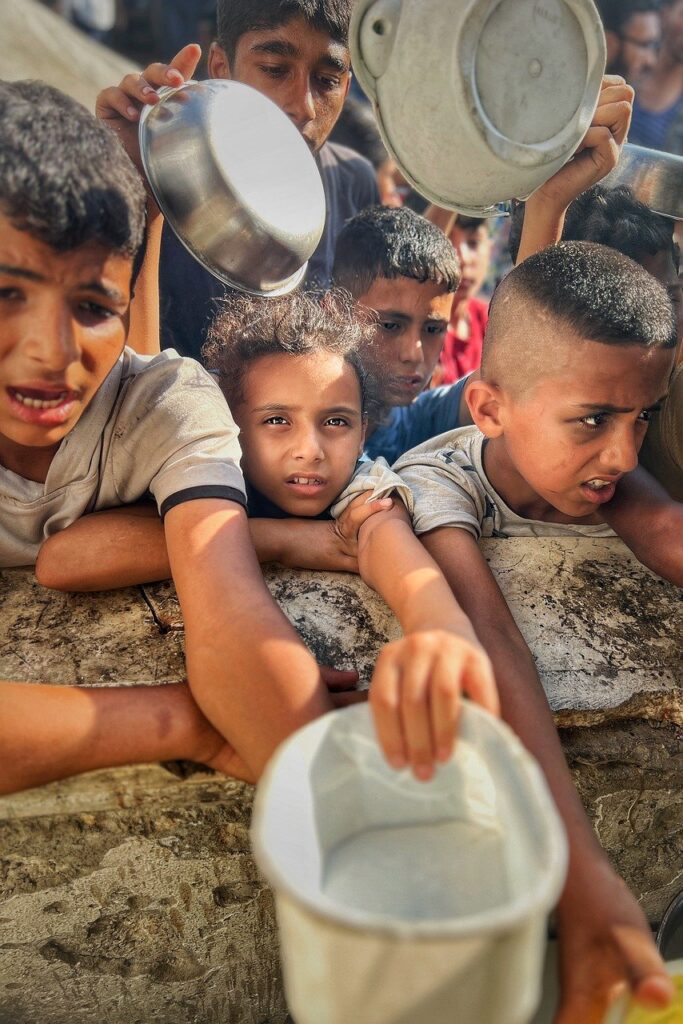
IJ: There is, as ever, it seems, ample suffering in many places where we might look. One place where many of us have been looking since October 7th–and many were looking long before that–is in Israel and Palestine. How does your understanding of Buddhist practice inform your response to what is happening today in the Middle East?
BB: My basic ethical orientation centers around fairness, non-violence, and the peaceful resolution of conflict. The Buddha himself exemplified these qualities in his own interaction with the society around him and in his guidelines for dealing with disputes within the Sangha. I see these principles as crucial to resolving the situation in Israel-Palestine.
One principle that Buddhism teaches is that to resolve a problem, one has to investigate its origins and seek out its root causes. This is what makes the Israel-Palestine conflict so intractable. One underlying root, as I see it, lies in competing claims to land—to the land that stretches from the Jordan River to the Mediterranean Sea. For the Jews, the land is their biblical home, the “promised land” bequeathed to them by God, the land where their ancestors lived for thousands of years before they were driven out by the Roman conquerors. For the Palestinians, the land is the place where they dwelt in relative peace for centuries, before the Zionist movement arose in Europe in the late nineteenth century and began the process of mass migration that led to the creation of the state of Israel in 1948. That event, which established a Jewish homeland, brought joy to the Jewish people, but it also marked the Nakba, “the Catastrophe,” when as many as 15,000 Palestinians were killed and 750,000 were expelled from their ancestral homes and driven into the West Bank, Gaza, and neighboring countries. Each side claims the land as its own, and therefore attempts to adjudicate their competing claims have repeatedly faltered, no doubt undermined by Israel’s enduring occupation of the Palestinian territories, the apartheid regime it has imposed in the occupied lands, and the expanding settlements in the West Bank, which mean that a large part of the West Bank has virtually been absorbed into Israel.
But the land itself is, in a sense, only a marker for the sense of a collective identity, virtually a tribal identity. The Jewish people of Israel—and their supporters abroad—have their sense of collective identity. The Palestinians have their sense of collective identity. The two identities clash over their historical pasts, over their claims to land, over their religious differences. And to prevail on the global stage, each side must dehumanize and demonize the other, sustaining a pathological hostility.
The events that began on October 7 raised the intensity of the conflict to a whole new level. The sheer brutality of Hamas’s attacks on Israelis, including their capture of hostages, must be condemned in the strongest terms. However, the intensity, ferocity, and inhumanity of Israel’s response must also be condemned in terms equally strong. But one basic moral principle that the outbreak of violence in Gaza has highlighted for me concerns the question, “Whose lives really matter?” Buddhist ethics teaches us that all human lives matter, that no life is inherently more precious or more valuable than others. Yet the way the conflict is portrayed in mainstream Western media shows a strong bias in favor of Israeli lives over Palestinian lives. When 1200 Israelis are killed by Hamas militants, this is lamented as a horrific tragedy, and the press gives us personal profiles of the victims. When 36,000 Palestinians are killed by Israeli military operations, we are given mere statistics, and the individual lives are treated as mere collateral damage. When university students protest against Israel’s campaign, congressional leaders call them “antisemites.” When the students reject this charge and maintain that they are really opposing the slaughter of the people of Gaza, they are suspended or expelled.
My own involvement with this issue started quite early. In the weeks after Israel launched its assault, I expected to see a huge wave of protest from Buddhist leaders and teachers, and I was perplexed when the response was almost total silence—honorable exceptions being Thanissara Weinberg, folks associated with her Sacred Mountain Sangha, and the Zen teacher Kritee Kanko. In late October, along with Alan Senauke, I drafted a letter to President Biden on behalf of American Buddhists, which we posted on the petition website Change.org. Within two weeks, the petition gathered about 2,000 signatures, and we sent it to Biden, Kamala Harris, and a few congressional leaders. But still, to my puzzlement, silence prevailed among American Buddhist leaders and in the major Buddhist journals.
I saw several prominent Buddhists write on Facebook things like, “We stand for peace,” or “Inner peace leads to world peace,” or “Love is the answer,” but I felt that this kind of response was not only inadequate but too simplistic, a cop-out from our moral responsibility. To articulate my own ethical assessment of the situation, I wrote an essay titled “No Time for Silence,” urging the American Buddhist community to stand up against the assault on Gaza. I tried to get the essay published in the major American Buddhist online journals, but none would accept it. However, Thanissara compiled a collection of essays called “Gaza: Calling for a Dharma Response,” in which she included my essay. Let me sum up the conclusion of the essay:
Though the background to the conflict may be complicated, extending back to the late nineteenth century, the moral temperature of the events playing out in Gaza over the past four months [now nine months] has been starkly clear. Thus, there is no excuse for standing speechless on the sidelines. Granted, Hamas triggered the latest round of violence with its horrific assault on Israel on October 7th, granted that Israelis should be able to live secure within their country’s borders, this cannot justify military operations that are killing and wounding hundreds of civilians each day or a program subjecting the whole population to mass starvation. Opposing such violations of basic human rights is not an endorsement of Hamas. Demanding that Israel comply with international law does not mean we side with terrorism. It is, rather, an act of courage and compassion. Again, taking a bold stand doesn’t mean that we are being swept away by discordant views and failing to maintain a stance of impartial equanimity. In my understanding equanimity should not stifle our capacity to make wise moral judgments or negate our obligation to act on the basis of clear ethical convictions. Equanimity can easily coexist with compassion and accompany conscientious action intended to rectify moral wrongs. The moral obligation in this case becomes especially compelling when it is our own country’s government that has been backing Israel in a campaign that the International Court of Justice determined may plausibly be considered genocide. (pp. 30-1)
Although I do not practice the Jewish religion, I still feel a resonance with the secular Jewish values I learned from my family—kindness, compassion, and concern for the good of others—and these, reinforced by my Buddhist values, make the crisis in Palestine especially heartrending to me. The fact that the U.S. continues to support Israel militarily and diplomatically, even in violation of our own professed commitment to international law, makes our own country complicit in the grave war crimes that Israel has been committing both in Gaza and the West Bank. Our unwavering support for Israel’s military campaign also mocks our claim to be the foremost defender of the rules-based global order. Our recalcitrance leaves us, along with Israel and a few small island-nations, almost isolated at the United Nations and other international bodies.
In response to the critical situation in Gaza, the international community must take two essential steps. First, we must persuade both Israel and Hamas to agree to a complete ceasefire, an end to hostilities to go into immediate effect, including release of the hostages held by Hamas as part of the deal. And second, we must compel Israel to open its land crossings and allow humanitarian aid to reach the people of Gaza; food, clean water, medical supplies, and fuel are all desperately needed. About a million people in Gaza are on the brink of starvation, lack potable water, and face lethal illness because of a complete lack of medicines. As Buddhists of conscience, we must put pressure on our representatives to work for a fair and just settlement of the conflict in Israel-Palestine. Though our letters, calls, and emails might seem futile, we shouldn’t discount the potentials of collective action.
What we need most is the trust that, if we take the initiative to act, in the spirit of love and compassion, somehow the deep hidden spiritual forces of the universe will come to our support, opening up roads of opportunity right at our feet.
We can also use our contemplative practices as ways to promote peace. For instance, we can meditate on compassion and dedicate our merits to the cause of peace. We can appeal to the devas and celestial bodhisattvas, requesting their intercession. These actions are not just imaginative exercises. I believe that beyond the visible plane there is a subtle psychic plane permeated by our thoughts, hopes, and aspirations. When these reach a critical threshold, they can trigger changes in the visible domain, perhaps exerting a subtle impact on the thought processes of global leaders or even causing material changes that pave the way for major transformations in the social sphere. Remember how, in the 1980s, unexpected things happened: the collapse of the Soviet Union, the end of the apartheid regime in South Africa, the affirmation of the rights of gays and lesbians, and other major shifts. We can’t discount the possibility that similar shifts might occur today. The conflict between Israelis and Palestinians has left deep psychic scars on both sides, traumas that will take a long time to heal, perhaps even a couple of generations; but if hatred and violence are to end, it’s necessary for both sides to lay down arms, begin talking to one another, and recognize the humanity of the other party: that at bottom, we all seek to be well and happy and to live secure from harm and suffering.
IJ: Finally, the tagline for Buddhist Global Relief is “compassion in action.” Do you have any recommendations for how Buddhist practitioners might be able to put their compassion into action as part of their practice?
BB: There are hundreds of ways to translate compassion into action, and we each have to find our own way to do so. One method that I often suggest is, first, to consider what kind of society we want to create and what kind of world we want to live in. I assume that almost anyone who subscribes to Buddhist ethics would wish to see a world where everyone can enjoy the basic material requisites of human flourishing. We would want a world of peace, where the natural environment is securely preserved and glaring disparities of wealth, power, and privilege have been eliminated. We want a world where people can live together in relative harmony, solving their problems through peaceful collaboration, free to pursue their personal goals as long as these don’t entail harm for others.
Having posited your vision of an ideal world—a utopia which, of course, will never be perfectly realized—you then explore the major issues confronting humankind today, the problems that impede the realization of this ideal even in part. You might look into issues relating to racial justice, gender equality, labor rights, the protection of the natural environment, the defense of immigrants, animal rights, and so forth, to mention just a few. You don’t have to become an expert in these areas, but just get a broad overview of the critical challenges we face today, especially those where, as members of the public, we can make a positive contribution. Then, in silent contemplation, you review these issues to find where your heart breaks open. You have to listen closely to the stirrings of the heart, and there you will hear your call into the world of “sacred action.” Of course, you have to choose a field where you can actually contribute.
You need not worry that you don’t have exceptional skills or talents. One aspect of our work today is to unite our personal talents with others in a shared endeavor rooted in compassion for people everywhere and care for a planet in severe jeopardy. By acting together, we can accomplish great things. What we need most is the trust that, if we take the initiative to act, in the spirit of love and compassion, somehow the deep hidden spiritual forces of the universe will come to our support, opening up roads of opportunity right at our feet. What is called for is a deep fountain of compassion, born of contemplation, meditation, and a strong intention to devote our efforts to the service of others. It’s been my experience that once we bring these factors together, the rest will unfold in ways we cannot anticipate.
This article was originally published by The Barre Center for Buddhist Studies’ Insight Journal. It is reprinted here with permission.
Articles by Bhikkhu Bodhi can be found here.

